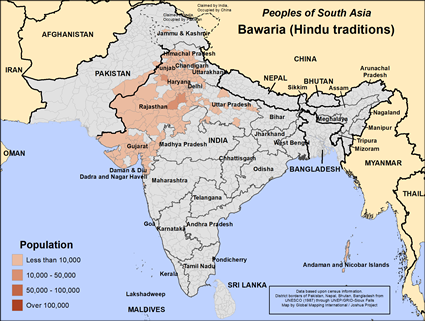According to their own legends, the Bawaria people of India and Pakistan were once part of the powerful Hindu Rajput caste. During a fight between the Mughals and the Rajputs, a Bawaria individual foolishly polluted the bauli, a street food made from an egg with cow's blood, which prevented the Rajputs from bringing their dead soldiers back from battlegrounds. When the Rajputs were defeated, the Bawari were exiled to the jungle to spend their days eking out an existence by hunting and gathering. Worse yet, they were now outcastes, a huge step down from their former Hindu caste status. They still consider themselves to be Rajputs, but other communities would not agree, though they have higher status than most outcastes.
Bawaria were known to use a noose for hunting, so their name is derived from a word for noose. Some of them still make ropes, but they are much more likely to be farmers.
The Bawaria of Pakistan speak Saraiki in their families. Men frequently can speak Urdu so they are able to communicate with outsiders.
Most of them live in the Indian states of Rajasthan, Punjab, and Delhi. There is a much smaller number in neighboring Pakistan.
Most Bawaria now work in agriculture. They often labor on land owned by others. They grow rice, wheat, lentils, maize, fruits, and vegetables. The Bawaria were formerly known as rope makers. With the rise of large factories that make rope on an industrial scale, the Bawaria have had to find new ways to make a living. Although the Hindu caste system has been officially outlawed by the Indian and Pakistani government, it still has a powerful influence, especially in rural areas. Low class groups like the Bawaria are denied jobs, educational opportunities and housing based on their low status.
Bawaria are monogamous, with one man marrying one woman. The Bawaria marry within their group. Families often arrange marriages when the young people are children. Lack of literacy is an issue for the Bawaria, particularly for women. Children tend to quit school early in order to help their families earn a living. Modern medicine is often not available in the places where the Bawaria live. As a result, many Bawaria children die young and life expectancy is low. The Bawaria tend to have large families. It is the sons' responsibility to take care of elderly parents and grandparents. Three or more generations frequently live under one roof.
The Bawaria of Pakistan are Hindus. Hinduism is the ancient religion of South Asia. Hinduism is a catch-all phrase for the local religions of South Asia, so it is very diverse. At the popular level, Hindus worship and serve the gods of the Hindu pantheon. They visit Hindu temples and offer prayers, food, flowers, and incense to their gods in hopes of gaining protection and benefits. They do not have a personal or familial relationship with their gods like Christians. There are other Hindus who are much more philosophical, especially among the Brahmins.
Almost all Hindus participate in yearly celebrations like Holi, the festival of colors and the start of spring / Diwali, the festival of lights / Navratri, the celebration of autumn / and Rama Navami, Rama's birthday.
The Bawaria would benefit by having good schools and access to modern medicine and clean water. The Bawaria, most of all, need to hear and understand the good news about Jesus Christ. He alone can forgive their sins and grant them abundant life.
Ask the Lord to send loving workers to the Bawaria of Pakistan.
Pray that Bawaria parents would be able to provide for the children.
Pray that the literacy level of the Bawaria would increase and that they would be able read the Bible portions available in Saraiki.
Pray that the Lord raises up a growing church among the Bawaria of Pakistan in this decade.
Scripture Prayers for the Bawaria (Hindu traditions) in Pakistan.
| Profile Source: Joshua Project |











